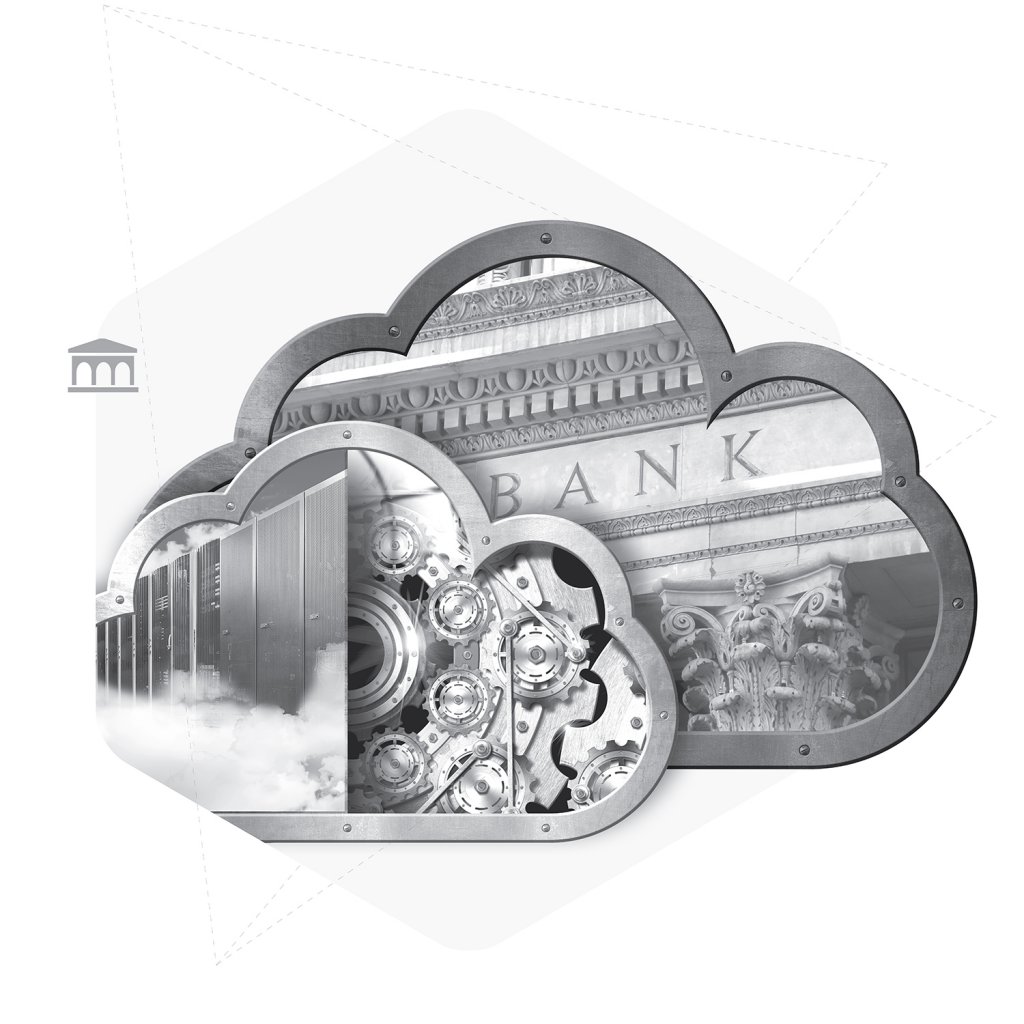
Banking on the cloud? There’s room for the most risk-averse financier
The call right across industry is for digital transformation. Apart from some artisanal areas which rely on the preservation of historical processes, and to which digitization would be an anathema, every enterprise is changing the way it works.
Pages on the web such as those found on this site detail how individual departments can bring technology to bear on its processes, to transform and therefore become more efficient and, with correct application, improve customer relations, and save time & money.
Some of these solutions stretch right across businesses, such as the big enterprise resource planning solutions (ERP), or whole customer-facing functions – CRM (customer relationship management). Technology’s application can be departmentally segmented (HR software), or industry-specific (supply chain management, manufacturing IoT and so forth).
The driving forces for the agile use of pertinent technologies are often financial, yet it’s true to say that in the experience of this author at least, the finance department in any organization is one of the last to embrace digitization. That isn’t due to any recalcitrance on the part of finance staff, nor any Luddite rejection of anything new. Rather, the underpinnings of any enterprise are its financial core. Finance departments are strategic in today’s enterprise, for sure, but also they represent the common glue which binds even widespread global companies.
In some ways, the banking sector is affected by many of the same concerns about its own digital modernization. New banks and startup fintechs can afford (literally) to adopt so-called disruptive processes as their products and services can be applied or used piecemeal. But in the larger financial institutions, such risk-taking is rightly regarded with some dismay.

Many banks’ in-house systems are a testament to this natural conservatism. The final resting place of many mainframe computers, legacy UNIX-based systems and even instances of COBOL code bases are to be found in larger banking concerns. Indeed, there is a good source of employment for developers of a certain age (!) in maintaining legacy COBOL code.
Although steering an established bank into some of the more esoteric areas of the latest tech is probably wise, even the most recalcitrant CFO will be aware of the potential positives which can be gained by moving discreet services into the cloud. Temenos, a provider of services to the financial sector (see below) conducted a survey among financial institutions and found the following statistics among its findings.
When asked about desired benefits from cloud services in their industry:
- 58 percent quoted a lower IT cost overall, compared to in-house provisions.
- 50 percent were keen to embrace the possibilities of new technology.
- 34 percent saw the possibilities of being able to add business functionality to their operations by dint of the cloud.

However, at the same time, the survey showed some of the barriers which were pointed out to cloud adoption:
- 55 percent were worried by data security.
- 47 percent had concerns over reliability and data availability.
- 45 percent had issues with regulatory compliance.
According to Mark Twain (or British prime minister Benjamin Disraeli, depending on your viewpoint), there is little in “lies, damned lies, and statistics”. With that edict firmly in mind, therefore, even the most skeptical might be surprised to learn that in (another) survey by ComScore, 94 percent of those companies switching to the cloud experienced security benefits they did not previously receive through their in-house systems.
The respondents to the ComScore survey were not all financial institution employees, of course, but the stats offer a decent validation of cloud technology’s inherent security levels. The billions of dollars which the cloud giants invest in their systems are unlikely to be unguarded, naturally. Plus with many industries left, right and center drawing and presenting essential services from or on the cloud, the onus is on Amazon, Microsoft, Google, IBM, NTT et al. to make sure things go beyond “tight” when it comes to cybersecurity.
Naturally, regulatory compliance features as a valid make-or-break issue to banks considering moving their processes into the cloud. But while cloud providers have been secretive about most of the nature of their cloud provisions – where the data centers actually are, for instance – they’re also aware that in finance, the place data is kept is the keystone of a bank’s regulatory compliance.

Therefore, all the big cloud providers offer EU-only, or UK-only, or US-only data centers, and are contractually bound to do so. Like their security provisions, the public relations disaster of malfeasance would be inestimable – it makes business sense for Microsoft to toe the line which their clients must toe, too. If data has to be kept in discreet geographies, according to disparate strictures and guidelines, that is a service it makes sense to offer.
Additionally, the nature of cloud provision is that availability of data can be more or less assured – assured at least to a level significantly higher than the level of data availability from in-house, legacy systems. The use of virtualized systems and software abstraction (amongst other technologies) means that data provision is maintained despite any physical or electronic bottlenecks, be they caused by infrastructure outage or fluctuations in demand from users.
CTOs of large banks will know well the sudden peaks in required power of in-house systems: most financial systems are under-utilized for the majority of the time, yet need to possess necessary capacity to ramp up at month’s end, or closure. Cloud providers’ systems are built on this ever-shifting demand foundation, and so can offer pay-as-you-use offerings – this presents significant savings to users.
Here at Tech Wire Asia, we’ve considered three of the world’s leading providers of the latest wave of electronic and cloud-based financial solutions. Read on to see how technology can be employed partially or wholesale by today’s forward-thinking financial institutions. While the push to transform digitally is changing much of industry, there are fewer reasons for the financial sector to resist than before. The following organizations can advise and help.
TEMENOS
Temenos creates software for banking and finance institutions and supports more than 3000 clients globally. This laser-like focus and consistent approach to investing in product development have led to 41 of the world’s top 50 financial institutions choosing Temenos’ solutions.

Temenos was the first vendor to provide a core banking system in the public Cloud in 2011. Today, Temenos’ packaged banking software, together with the flexibility cloud technology, provides a compelling offering for institutions at any scale.
Temenos is able to offer its digital solutions alongside long-term technology partner Microsoft Azure utilizing the public cloud infrastructure. As a result, clients benefit from benefit from more stringent data security and compliance measures.
Cloud software has a well-deserved reputation for quick deployment. Despite its necessary highly specialized and localized features, Temenos’ platform comes pre-configured to each geography and is available on a pay-as-you-use, “open” model.
Cloud remains a strategic pillar of Temenos, with a primary focus on the use of public cloud. The company’s banking software systems were created with agility in mind, allowing Temenos’ clients to create new offerings, and deploy them at scale, at high speeds.
TUNGSTEN NETWORK
Tungsten Network has positioned itself as a digital business transaction network, where it can empower businesses to negate the day-to-day problems of chasing invoices, achieving early payments, and mitigating the effects of repetitious and error-prone workflows.

The London-based company has offices across the globe, including two in the US and another in Kuala Lumpur. It currently processes invoices for nearly 80 percent of the Fortune 500 list of businesses, and 67 percent of the FTSE 100 use its services. Last year it processed transactions worth over UK£155 billion for organizations which are, in many places, household names: Deutsche Lufthansa, General Motors, Glaxo Smith Kline, IBM, and Alliance Data.
For companies wishing to dip a toe in the water of digital transaction management, using a service like Tungsten’s can make the difference between maintaining legal compliance in new territories, and either falling foul of the law, or putting a crimp on transnational expansion plans altogether. In either unfortunate scenario, the outcome is usually the loss of customer numbers.
In addition to transactional processing, Tungsten Network Analytics give a business intelligence-oriented insight into improvements in procurement controls and offer reduced costs by flagging up potential bottlenecks and difficulties in internal processes.
ORACLE
No discussion of FinTech or indeed cloud-based services would be complete without one of the global internet giants’ presence. Therefore honorable mention needs to be made of Oracle, the world’s best-known database provider; and more latterly the supplier of just about every IT solution under the sun.

For those with existing, legacy systems, the company offers a cloud-based API which presents use of a simpler, less complicated infrastructure than an existing data center’s. This thereby combines the safety of existing systems with new fintech- or bank-oriented digital services, so that Oracle’s clients can offer new services and open up new revenue channels.
Oracle clearly sees the future in the cloud, with the malleability of retail, money and financial transactions as becoming streams of data – whether that’s cryptocurrency-based on public blockchain or movement of funds from one virtual wallet held by a large institution to another.
The company offers a range of banking software solutions, suitable for both fintech start-ups and existing global multinationals. In the case of the latter, the chances are at least some area of the enterprise will already have felt Oracle’s presence. The company, therefore, sees itself as a partner as larger institutions change and adapt.
*Some of the companies featured in this article are commercial partners of Tech Wire Asia
READ MORE
- Ethical AI: The renewed importance of safeguarding data and customer privacy in Generative AI applications
- How Japan balances AI-driven opportunities with cybersecurity needs
- Deploying SASE: Benchmarking your approach
- Insurance everywhere all at once: the digital transformation of the APAC insurance industry
- Google parent Alphabet eyes HubSpot: A potential acquisition shaping the future of CRM
